What is dystrophin and why is it important?
In DMD, a gene change (mutation) prevents the body from producing enough of a protein called dystrophin.1–3 Dystrophin acts as a shock absorber or stabiliser for muscles.4 If the body does not have enough dystrophin, muscle cells become more sensitive to damage and deteriorate over time.3 The injured muscles are gradually replaced with fat and scar tissue, with the resulting loss of muscle leading to the symptoms of DMD.1–3,5
Learn about Duchenne muscular dystrophy symptoms
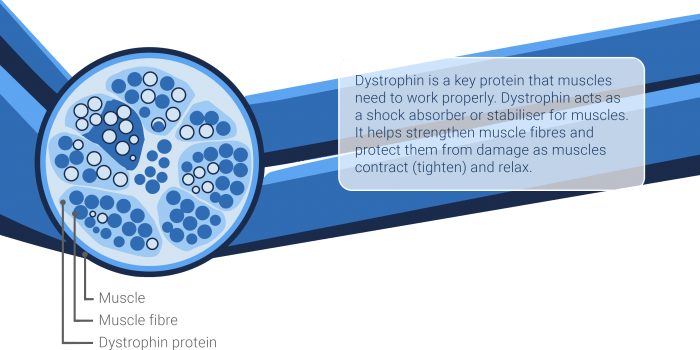
What causes the lack of dystrophin in Duchenne muscular dystrophy?
DMD is a genetic disorder, which means that it is caused by changes (mutations) in a certain gene.1,2 Genes are made up of DNA, a code that tells the cells in our body how to make proteins. Proteins are the building blocks of our bodies, and they are needed to make and replace cells. In DMD, the dystrophin gene is altered, meaning the body cannot make dystrophin.6 Without dystrophin, muscle cells are easily damaged.2,5
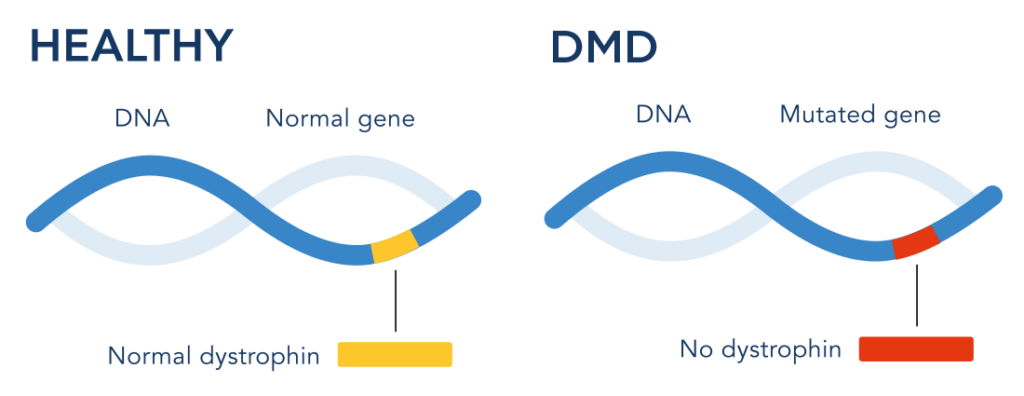
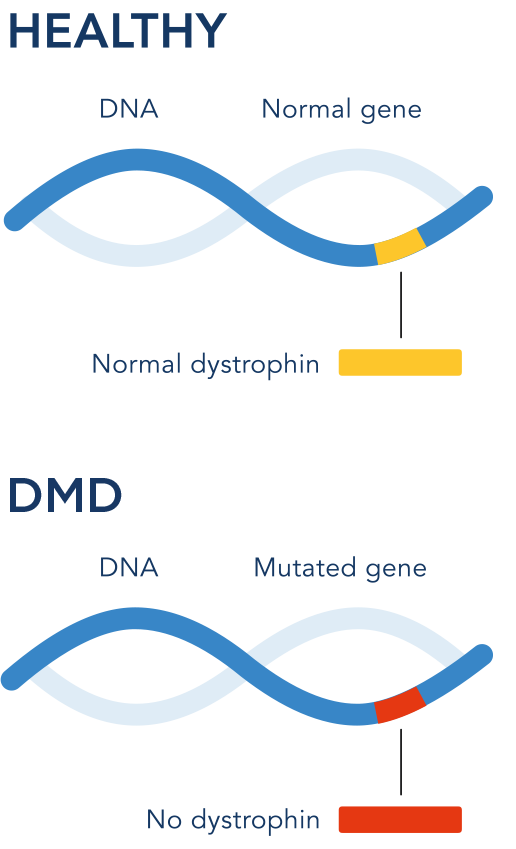
Duchenne muscular dystrophy is caused by different types of mutations in the dystrophin gene
Most cases of DMD are caused when large pieces of the dystrophin gene are lost or deleted (‘deletion’).5,7
Less often, large pieces of the dystrophin gene are copied or duplicated (‘duplication’).5,7
DMD can also be caused by small changes to the DNA code (‘small alteration’).5,7
Although most therapeutic strategies can be used regardless of the genetic alteration, in some cases treatment for a specific type of alteration may be available.7

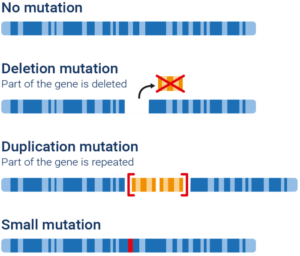
What causes the gene mutations in Duchenne muscular dystrophy?
The alteration in the gene that codes for dystrophin can be either:8,9
- Inherited, i.e. passed down through the family
- Spontaneous, i.e. caused by a new genetic change
Spontaneous mutations mean that sometimes DMD can occur without any family history of the disease. These new mutations can also be passed on to the next generation.8,9
The dystrophin gene is the largest known human gene, which means that it is at more risk of spontaneous mutations than smaller genes.1
These new mutations can arise in a mother’s egg cell in two ways:
- When the mother’s body produces the egg cell (i.e. during ovulation)9
- During conception (i.e. when the sperm and the egg cell fuse together)10
Any baby that is born in these situations will carry the altered dystrophin gene and also pass it on to any biological children they have in the future.8,9

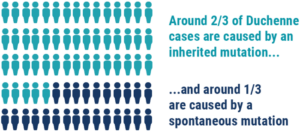
Is Duchenne muscular dystrophy inherited?
Yes, DMD is inherited.
However, it’s important to remember people have no choice in the genetic conditions that are passed on in a family. Nobody did anything wrong to cause DMD, so there is no reason to blame yourself or others.
How is Duchenne muscular dystrophy inherited?
Each cell in the human body has 23 pairs of chromosomes (long threads of DNA) in the nucleus. One of these pairs carries genes that determine whether a person is male or female:
- Males have two different sex chromosomes called X and Y
- Females have two X chromosomes, XX

DMD is known as an ‘X-linked’ disease, which means that the gene causing the disorder is located on the X chromosome:10
- Every male inherits one of his biological mother’s X chromosomes and his biological father’s Y chromosome. If a male’s X chromosome contains an altered dystrophin gene, he will have DMD10
- Females inherit two X chromosomes, one from each biological parent. If a female’s X chromosome contains an altered dystrophin gene, they have a ‘back-up’ copy of the dystrophin gene, which usually compensates for the altered one. A female with the altered dystrophin gene is called a ‘carrier’10
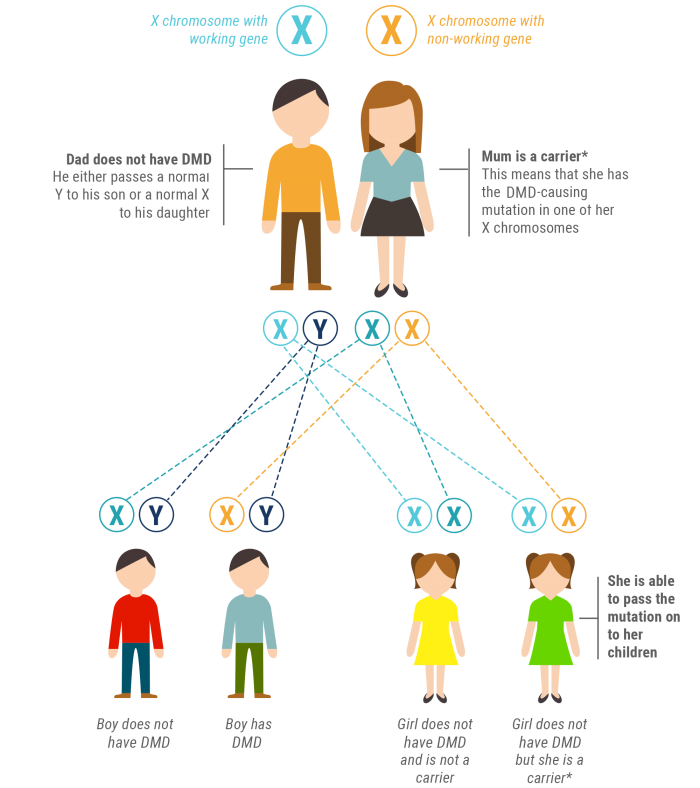
*Carriers may show signs and symptoms of DMD and may need treatment
While the chances of having a female baby being born with DMD are extremely low – approximately 1 in 50 million – it can happen.12
- A female will only develop DMD if both of her X chromosomes have altered dystrophin genes11
- Females affected by DMD normally have less severe symptoms than males, but any they do have can be managed in the same way10
A male with DMD can never pass the condition on to his son.10
- An affected father only passes a Y chromosome to his biological sons (the DMD-causing gene is located on the X chromosome)10
- However, he will pass the DMD-causing gene on to his biological daughters, because each daughter inherits her biological father’s only X chromosome. These daughters will be carriers10
What does being a Duchenne muscular dystrophy carrier mean for a female?
Normally, females who carry the DMD-causing gene produce enough dystrophin and do not show symptoms.10
- If a female inherits the faulty dystrophin gene, she has a ‘back-up’ healthy copy of the gene on her other X chromosome to compensate10
- However, sometimes a carrier is still unable to produce enough dystrophin. This means that they will experience some signs and symptoms of DMD10
- In all carriers, regular strength check-ups and close heart monitoring are important to make sure that any symptoms that may arise are properly treated3,10
If a female DMD carrier becomes pregnant, her baby may have DMD.10
- There is a 50% chance of a carrier having a child with DMD or being a carrier. This means that for every biological baby boy she has, there is a 1 in 2 chance that the child will have DMD10
- It is therefore very important for female relatives of people with DMD to get tested to find out whether or not they are carriers3,10
Understand the importance of genetic counselling in DMD
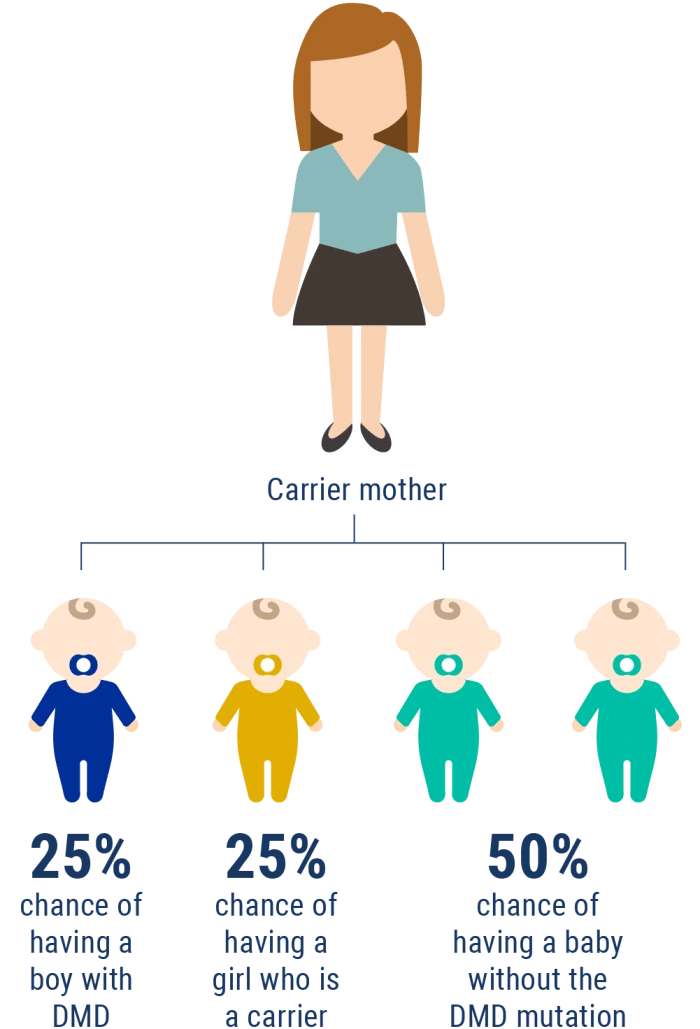
Developmental delay in children can be an early sign of DMD.13
Learn more about Duchenne muscular dystrophy symptoms
Find out more

Duchene muscular dystrophy symptoms
Understand the key symptoms to be aware of in DMD.

Duchenne muscular dystrophy diagnosis
Early diagnosis of DMD is important, find out more on how this is done.

Genetic counselling
Genetic counselling can help guide you through the genetic testing process in DMD and also offer emotional support.

The ultimate guide to Duchenne muscular dystrophy
Everything you need to know about DMD, all in one place.
References
- National Institute of Neurological Disorders and Stroke. Muscular dystrophy: hope through research. Available at https://www.ninds.nih.gov/Disorders/Patient-Caregiver-Education/Hope-Through-Research/Muscular-Dystrophy-Hope-Through-Research [last accessed September 2022].
- Goemans N, et al. Eur Neurol Rev. 2014;9:78–82.
- Birnkrant DJ, et al. Lancet Neurol. 2018;17:251–267 [Part 1].
- Muscular Dystrophy Association. Duchenne muscular dystrophy (DMD). Available at https://www.mda.org/disease/duchenne-muscular-dystrophy/research [last accessed September 2022].
- Houang EM, et al. Skelet Muscle. 2018;8:31.
- Amato AA, Brown RH Jr. Muscular Dystrophies and Other Muscle Diseases. In: Longo DL, et al., editors. Harrison’s Principles of Internal Medicine. 19th edition.
- Ervasti JM. Biochim Biophys Acta. 2007;1772:108–117.
- Kalman L, et al. J Mol Diagn. 2011;13:167–174.
- Duchenne UK. What are the causes of DMD? Available at https://www.duchenneuk.org/what-causes-duchenne/ [last accessed September 2022]
- Muscular Dystrophy Association. Causes/inheritance. Available at https://www.mda.org/disease/duchenne-muscular-dystrophy/causes-inheritance [last accessed September 2022].
- National Institutes of Health. What is a gene mutation and how do mutations occur? Available at https://ghr.nlm.nih.gov/primer/mutationsanddisorders/genemutation [last accessed September 2022].
- Duchenne UK. Can girls and women have DMD? Available at https://www.duchenneuk.org/what-is-duchenne/ [last accessed September 2022].
- Lurio JG, et al. Am Fam Physician. 2015;91:38–44.
© 2022 PTC Therapeutics.
GL-DMD-0653 | October 2022